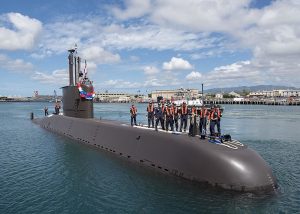The United States, United Kingdom, and Australia announced last week that the three will cooperate to allow Australia to develop a nuclear-powered attack submarine (SSN). This new pact, dubbed AUKUS, will significantly strengthen the trilateral Australia-U.K.-U.S. relationship, bolstering Australia’s ability to project power throughout the Indo-Pacific region and helping to offset China’s rising naval capabilities. It also presents an opportunity for the United States to rethink its stance on the SSN aspirations of another critical Indo-Pacific ally: South Korea.
Seoul has repeatedly expressed its interest in either purchasing or producing a SSN. Former President Roh Moo-hyun launched a covert effort to explore nuclear propulsion in 2003, and current President Moon Jae-in has emphasized the South Korean need for an SSN force. However, despite South Korea’s longstanding interest in this platform, the United States has been reluctant to provide assistance due to non-proliferation concerns. The Dong-A Ilbo reported that the Trump administration rebuffed South Korean entreaties for low-enriched uranium for naval reactors in 2020.
We argue that the United States should reconsider its decision to withhold support for a South Korea SSN program. The U.S. needs more capable allies in the Indo-Pacific region given the rapid advancements in China’s military power. As the Biden administration has emphasized, China’s growing anti-access, area-denial (A2/AD) capabilities and emerging power projection capabilities threaten the regional military balance and U.S. interests. Washington doubtless hopes that Australian SSNs developed through the AUKUS pact can help confront this emerging challenge. South Korean SSNs could play a similar role, bolstering a key U.S. partner’s ability to contribute to allied naval operations throughout the broader Indo-Pacific region.
SSNs, while more costly than their diesel-electric (SSK) counterparts, offer enhanced speed, endurance, and range. They can transit more swiftly should conflicts emerge far from the Korean Peninsula in the Taiwan Strait, South China Sea, or Indian Ocean while remaining submerged. Generally speaking, SSNs can support much more capable combat systems and perform more effectively than SSKs in both anti-submarine and anti-surface warfare. Given their ability to operate stealthily beneath the ocean’s surface for months at a time, SSNs are ideally suited to the increasingly contested waters of the Indo-Pacific, where China’s growing arsenal of anti-ship missiles and long-range bombers increasingly threaten surface vessels.
The United States has withheld support for a South Korean SSN program in part due to non-proliferation concerns. Some experts worry that this capability would bring South Korea closer to being able to pursue a nuclear weapon. It is worth noting, however, that Seoul is seriously considering developing a SSN even without U.S. assistance or approval. If the U.S. cooperates with South Korea in developing SSNs, it will be better positioned to ensure appropriate safeguards and accountancy measures are put in place.
Additionally, U.S. support for a South Korean SSN program would bolster the United States’ credibility as an ally. North Korea’s growing ability to strike the U.S. homeland with nuclear weapons, China’s rising regional military and economic influence, and concerns about internal divisions and political turmoil in the U.S. have all contributed to considerable anxiety in Seoul over the dependability of the United States as an ally. A new agreement to share submarine technology with South Korea could serve as a powerful signal of U.S. commitment and would doubtlessly generate considerable goodwill in Seoul. Indeed, U.S. support for a South Korean SSN program could go a long way toward convincing Seoul to step up its support for U.S. efforts to maintain a free, open, and secure Indo-Pacific maritime commons. Conversely, if Washington continues to withhold support for Seoul’s SSN aspirations, even after offering the technology to Australia, it may further undermine South Korea’s confidence in its ally’s commitment and reliability.
Of course, any U.S.-South Korea agreement to work toward a Korean SSN would require considerable diplomatic effort. The current U.S.-ROK 123 agreement would need to be revised to allow South Korea to use enriched uranium for SSN reactors. Seoul would have to take concrete measures to address the United States’ legitimate concerns about nuclear proliferation. The U.S. would need to consult with other regional allies, particularly Japan, to alleviate any worries they might have about South Korea’s SSN program.
Overall, however, U.S. efforts to assist a South Korean SSN program would strengthen the allies’ ability to cope with a more assertive and powerful China. The United States has long called on its Indo-Pacific partners to bolster their military capabilities and step up their contributions to regional security. The U.S. should welcome the fact that Seoul is ready to answer this call.

































